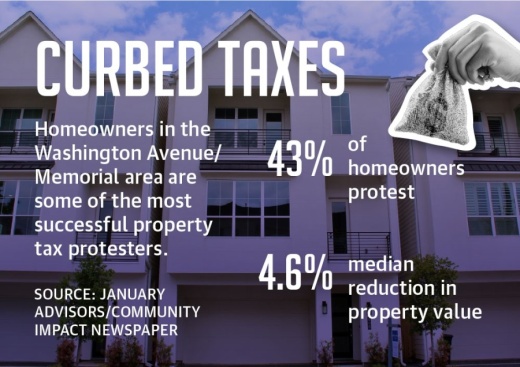“Every year they raise [the property appraisal] like $25,000 or $50,000. They bring it up; I push it down,” he said. “It’s like a little dance we do every year.”
While he has had success filing protests on his own, he said he might consider hiring a tax professional if it helps get him more savings.
“The county doesn’t explain how they arrive at their value number. Instead the burden of proof is on us, rather than the other way around,” he said. “It’s mysterious and arbitrary.”
Younes’ home was one of over 415,000 Harris County accounts that appealed their values last year—a record number and part of an upward trend of residents pushing back on their property tax bills.
“People think the process is intimidating, but it’s not,” said Michael Howard, a property tax consultant with BR Lawson & Co. “If you have the time, you should do it.”
“People think the process is intimidating, but it’s not,” said Michael Howard, a property tax consultant with BR Lawson & Co. “If you have the time, you should do it.”
While protesting is increasingly popular, results are mixed, and some neighborhoods appear to be more successful than others. For example, almost three-fourths of protests in the River Oaks and Washington Avenue/Memorial Park areas are successful, but other areas such as Independence Heights and Near Northside have success rates below 50%.
In 2019, protests reduced tax bills countywide by an estimated $444 million, according to January Advisors. Meanwhile, some lawmakers are pushing for reforms to limit appraisal increases.
Setting values
Each spring, the HCAD, which is independent from the county government, sends property owners their market and appraised values for the tax year. In turn, these values inform taxing entities such as cities and school districts, which set a tax rate to generate revenue.
“Property taxes are what support critical local services, primarily education but also police, fire, road maintenance, parks, libraries, all of those things that make a community more desirable to live in,” HCAD Chief Communications Officer Jack Barnett said.
Appraisal districts use a process called mass appraisal, which looks at comparable properties within an area to determine market value, which can result in inconsistencies.
“We saw the same proposed values and logic applied to our house as those that received massive renovations,” said Lisa Gossett, whose Meyerland home flooded during Hurricane Harvey in 2017.
The county also includes land values along with structures.
“This is kind of where it gets tricky between appraisal and real estate because if the properties in your neighborhood go up because it’s a desirable neighborhood, the market value of your house is going to go up,” Barnett said.
Texas nondisclosure laws prevent sales prices from being released, so the county relies on third-party data to get a sense of real estate trends. The county also takes into account alterations—from new fences to a patio addition—as well as the overall quality of a structure.
The appeal of protests
With an appraisal on hand, homeowners face a choice: either accept the number or file a protest—either on their own at no cost or by hiring a consultant.
The protest deadline typically falls May 15 with the county accepting both paper forms or online submissions through its iFile system.
The filing is followed by an informal meeting with a district appraiser, who might provide a revised appraisal.
“I would say in the ballpark range of about 30%-40% of our accounts are settled in that process,” Howard said. “But after that meeting, if we can’t settle anything, can’t agree on a value, then we’ll go to the Appraisal Review Board.”
There are 190 members on the board, which serves as an independent body that resolves disputes between property owners and the appraisal district. The board holds 1,500 panel hearings each day from May through August, which are being held virtually since the pandemic. During the meeting, appellants have 15 minutes to state their case to three board members.
A property tax consultant, who is paid by taking a portion of the taxes saved, is the preferred choice in Harris County with over 68% of property owners choosing that option when pursuing a protest. However, January Advisors found that homeowners who filed a protest on their own did just as well and in some cases did better than those who hired a firm.
“A property owner could very well get better results than a consultant because they are so much more familiar with the property,” said Darlene Okonski, a homeowner tax consultant with Marvin F. Poer and Co. “They know the ins and outs of the neighborhood and everything.”
Gossett hired a firm in years past but gave it up when no reductions materialized.
“The preparation makes all the difference, but residents can get somewhat varied results,” Gossett said.
January Advisors also found the effective discount on property taxes seems to favor residents in wealthy neighborhoods, who are also more likely to protest their values.
“HCAD is generally applying increases equally if you’re looking at percentages ... but a $5,000 increase in Denver Harbor is arguably worth more to a family there than a $60,000 assessment value increase in Piney Point Village,” January Advisors founder Jeff Reichman said.
Further review
Protest activity has been on an upward trend for at least the past decade with the number of accounts under appeal increasing almost 30%, according to HCAD data.
These appeals are increasingly settled beyond the ARB process with 10 times as many cases going before arbitration in 2019 as in 2010 and almost three times as many cases going into litigation. Many of these cases involve large commercial, industrial and multifamily properties, Barnett said, which are subject to higher rates of increases because they do not have access to caps such as the homestead exemption, which limits year-over-year value increases to 10% or less.
State Rep. Cody Vasut, R-Angleton, is one of several state lawmakers who have filed bills calling for reforms of the appraisal process. His House Bill 299 proposes a 3.5% cap for homesteads and allowing caps on commercial properties.
“The idea is to make your tax bill more predictable, a smoother increase over time,” Vasut said. “We’re trying to carve off those really high increases so that people can budget for and afford their tax bill each year.”
Until these or other reforms are considered, taxpayers continue to have the protest process to try to bring their own tax obligations down each year.
“Even if you think your value is OK, protest it,” Howard said. “It’s your right to protest your property taxes.”





